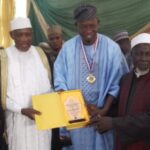ISLAMIC scholars have traced the leadership problem in Nigeria to the absence of the knowledge and fear of Allah among members of the political class.
The scholars spoke at this year’s edition of the annual State Lecture of The Muslim Congress (TMC), where they advised the political class to stop promoting bigotry in all forms in order to free the country from stagnation.
The programme with the theme ‘Towards National Development, Growth and Stability’, held in Ilorin to mark Nigeria’s 63rd independence anniversary, featured lectures, prayers and other activities.
In a remark, a guest lecturer, Ustadh Bola Sideeq (Amoye), said it was high time Nigerians recognised that academic excellence alone does not guarantee competence in matters of leadership, especially in politics.
“People should not see leadership competence as having academic brilliance or educational achievement. If that is the case, why is it that our educated leaders in Nigeria have not been able to solve our development crisis which has manifested in economic retrogression and social malady,” Sideeq said.
According to him, the way out is to combine leadership with the fear of God.
“The constitution of Nigeria does not teach us to fear God or to love and be kind our neighbour. It is about individualism, which is not sensitive to our roots,” he added.
Another speaker, the Chief Imam of Fountain University, Osogbo, Imam Surajudeen Barkrin, said Nigerians should shun all forms of sentiments and de-emphasise affiliations when appointing people into positions of authority.
“Allah has blessed and strengthened us with our diversity, but because we have allowed sentiments to cloud our reasoning, we have not been able to identify the opportunities and benefits we have been endowed with.
“We should look at those unique things in each of our tribes and harness them to move the nation forward,” Imam Barkrin said.
The wali (leader) of TMC in Kwara State, Idris AbdulHakeem Dare, said the lecture was organised to contribute “our own quota to the development and stability of the country.
“Nigeria is facing a multitude of socio-economic and political challenges. As we mark 63 years of existence as an independent nation, our gathering is to seek solutions to these problems and challenges in all sectors.
“We think that if our leaders implement these solutions well, the county will be better in terms of educational, political and social-economic development,” Dare submitted.
A participant, Dr Olaniyi Kamil Yusuf of the Department of Chemistry, University of Ilorin, described the programme as mind-blowing, saying it had broadened his mind about his responsibilities towards the development of the country.
The Amira of Al-Mu’minaat (The Believing Women) Organisation in Kwara State, Hajiya Rashidat AbdulRazaq, said the programme had was beneficial and expressed the hope that it would “ginger our political leaders to do the right things.”
READ ALSO FROM NIGERIAN TRIBUNE
WATCH TOP VIDEOS FROM NIGERIAN TRIBUNE TV
- Let’s Talk About SELF-AWARENESS
- Is Your Confidence Mistaken for Pride? Let’s talk about it
- Is Etiquette About Perfection…Or Just Not Being Rude?
- Top Psychologist Reveal 3 Signs You’re Struggling With Imposter Syndrome
- Do You Pick Up Work-Related Calls at Midnight or Never? Let’s Talk About Boundaries






